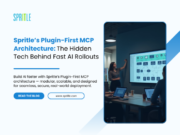
Based on the American Street and Transportation Builders Affiliation, one in three bridges wants restore or substitute, amounting to greater than 200,000 bridges throughout the nation. A key wrongdoer of America’s ageing infrastructure is rebar that has collected rust, which cracks the concrete round it, making bridges extra more likely to collapse.
Now Allium Engineering, based by two MIT PhDs, is tripling the lifetime of bridges and different buildings with a brand new know-how that makes use of a chrome steel cladding to make rebar resilient to corrosion. By eliminating corrosion, infrastructure lasts for much longer, fewer repairs are required, and carbon emissions are lowered. The corporate’s know-how is definitely built-in into present steelmaking processes to make America’s infrastructure extra resilient, inexpensive, and sustainable over the subsequent century.
“Throughout the U.S., the everyday bridge deck lasts about 30 years on common — we’re enabling 100-year lifetimes,” says Allium co-founder and CEO Steven Jepeal PhD ’21. “There’s an enormous backlog of infrastructure that must be changed, and that has frankly aged quicker than it was anticipated to, largely as a result of the supplies we had been utilizing on the time weren’t minimize out for the job. We’re making an attempt to trip the momentum of rebuilding America’s infrastructure, however rebuild in a approach that makes it final.”
To perform that, Allium provides a skinny protecting layer of chrome steel on prime of conventional metal rebar to make it extra proof against corrosion. About 100,000 kilos of Allium’s stainless steel-clad rebar have already been utilized in development tasks across the U.S., and the corporate believes its course of could be shortly scaled alongside metal mills.
“We combine our system into mills in order that they don’t need to do something in a different way,” says Jepeal, who co-founded Allium with Sam McAlpine PhD ’22. “We add every thing we have to make a traditional product right into a stainless-clad product in order that any mill on the market could make a fabric that received’t corrode. That’s what must occur for the entire world’s infrastructure to be longer lasting.”
Towards higher bridges
Jepeal accomplished his PhD within the MIT Division of Nuclear Science and Engineering (NSE) underneath Professor Zach Hartwig. Throughout that point, he noticed Hartwig and fellow NSE researchers spinout Commonwealth Fusion Techniques to create the primary industrial fusion reactors, which he says sparked his curiosity in startups.
“It undoubtedly helped me catch the startup bug,” Jepeal says. “MIT can also be the place I bought my supplies science chops.”
McAlpine accomplished his PhD underneath Affiliate Professor Michael Brief. In 2019, McAlpine and Brief had been engaged on an ARPA-E-funded challenge wherein they’d mix metals to enhance corrosion-resistance in excessive environments.
Jepeal and McAlpine determined to begin an organization round making use of the same strategy to enhance the resilience of metals in on a regular basis settings, working with MIT’s Enterprise Mentoring Service and talking with Tata Metal, one of many largest metal makers on this planet that has labored with the MIT Industrial Liaison Program (ILP). Members of Tata informed the founders that one in every of their largest issues was metal corrosion.
A key early downside the founders got down to clear up was depositing corrosion-resistant materials with out including vital prices or disrupting present processes. Steelmaking historically begins by placing large items of precursor metal by way of machines referred to as rollers at extraordinarily excessive temperatures to stretch out the fabric. Jepeal compares the method to creating pasta on an industrial scale.
The founders determined so as to add their cladding earlier than the rolling course of. Though Allium’s system is personalized, in the present day the corporate makes use of present items of kit utilized in different steel processing functions, like welding, so as to add its cladding.
“We go into the mills and take large chunks of metal which might be going by way of the steelmaking course of however aren’t the end-product, and we deposit chrome steel on the skin of their low cost carbon metal, which is usually simply recycled scrap from merchandise like vehicles and fridges,” Jepeal says. “The handled metal then goes by way of the mill’s typical course of for making finish merchandise like rebar.”
Every 40-foot piece of thick precursor metal turns into a few mile of rebar following the rolling course of. Rebar handled by Allium remains to be greater than 95 p.c common rebar and doesn’t want any particular post-processing or dealing with.
“What comes out of the mill seems like common rebar,” Jepeal says. “It’s simply as robust and could be bent, minimize, and put in in all the identical methods. However as a substitute of being put right into a bridge and lasting a mean of 30 years, it is going to final 100 years or extra.”
Infrastructure to final
Final yr, Allium’s manufacturing facility in Billerica, Massachusetts, started producing its first industrial cladding materials, serving to to fabricate about 100 tons of the corporate’s stainless steel-clad rebar in collaboration with a associate metal mill. That rebar has since been positioned into development tasks in California and Florida.
Allium’s first facility has the capability to provide about 1,000 tons of its long-lasting rebar annually, however the firm is hoping to construct extra amenities nearer to the metal mills it companions with, ultimately integrating them into mill operations.
“Our mission of lowering emissions and enhancing this infrastructure is what’s driving us to scale in a short time to satisfy the wants of the trade,” Jepeal says. “Everybody we discuss to desires this to be greater than it’s in the present day.”
Allium can also be experimenting with different cladding supplies and composites. Down the road, Jepeal sees Allium’s tech getting used for issues past rebar like practice tracks, metal beams, and pipes. However he stresses the corporate’s deal with rebar will hold it busy for the foreseeable future.
“Virtually all of our infrastructure has this corrosion downside, so it’s the most important downside we might think about fixing with our set of abilities,” Jepeal says. “Tunnels, bridges, roads, industrial buildings, energy vegetation, chemical factories — all of them have this downside.”





































